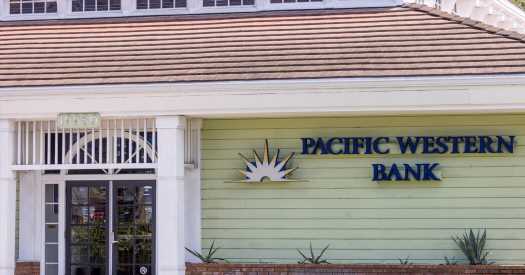PacWest Says It’s Exploring Options After Shares Plunge
PacWest Bancorp, a midsize lender that has been under pressure after three of its larger peers failed this year, issued a statement overnight, after its share price suddenly dropped, saying it was continuing to look to sell assets to shore up its finances.
PacWest said that it was planning to sell a $2.7 billion loan portfolio, and that it was reviewing other options after being approached by potential “partners and investors.” The bank also said it had not seen an “out-of-the-ordinary” outflow of deposits in recent days. Deposits stood at $28 billion as of Tuesday, compared with roughly $29 billion that it said it held in late April.
The bank released the updated details after its shares had plunged more than 50 percent in late trading on Wednesday. That drop came after Bloomberg News reported that the bank was working with advisers to explore options, including a sale.
In premarket trading on Thursday, PacWest was down about 37 percent. Two other regional lenders, Western Alliance and Zions Bancorp, fell 19 percent and 10 percent.
The share swings are the latest in the spiraling crisis for these smaller banks that has been punctuated by the failures of Silicon Valley Bank and Signature Bank in March and the seizure and sale of First Republic Bank this week.
PacWest, based in Los Angeles, has already lost more than 70 percent of its value this year. Investors have become skittish about any news that could be hinting at the next potential regional bank to fall, making for extremely volatile trading sessions.
Investors who bet on share prices falling, known as short sellers, have made huge returns on regional banks’ stocks. Since the collapse of Silicon Valley Bank in March, the return on short-selling First Republic shares was more than 200 percent, according to the market data firm S3 partners. Some investors are recycling profits from those trades to set their sights on other regional banks, like PacWest, Western Alliance, Zions and others. Heavy activity by short sellers can exert downward pressure on a company’s share price.
Stock prices are an imperfect measure of a lender’s health, but an intensifying challenge for bankers and regulators is how to keep the turmoil in the stock market from spilling into lenders’ day-to-day businesses, potentially by spooking depositors.
Resolving investors’ fears is tricky. With share prices beaten down and interest rates rising, any attempt to raise capital by selling stock would be costly and damaging to a bank’s existing investors. Selling a bank’s assets to raise funds, including loans and securities with low interest rates, would lock in losses that could otherwise be avoided.
PacWest has been a worry for investors since the concerns about small banks first emerged this year. Like the failed Silicon Valley Bank, PacWest had a large number of unsecured depositors and does a lot of business with the technology industry. The Federal Deposit Insurance Corporation insures up to $250,000 in deposits, and that has left banks with a large share of uninsured deposits vulnerable to runs if clients — fearing they won’t have access to their deposits — rush to pull their money out.
Days before it failed, for example, First Republic reported outflows of more than $100 billion in deposits over just a few weeks.
But PacWest has tried to address the worst of those fears. Last week, the bank said that deposit outflows had begun to reverse, and that insurance covered nearly three-quarters of its total deposits as of April 24, up from just 48 percent at the end of December.
PacWest said in March that it had raised $1.4 billion from an investment firm and about $15 billion from various federal programs, including those set up after the demise of Silicon Valley Bank and Signature Bank. At the time, PacWest also said it had considered selling a stake in itself, but decided that the depressed value then for regional bank stocks meant that such a move “would not be prudent.”
Bernhard Warner contributed reporting
Source: Read Full Article

